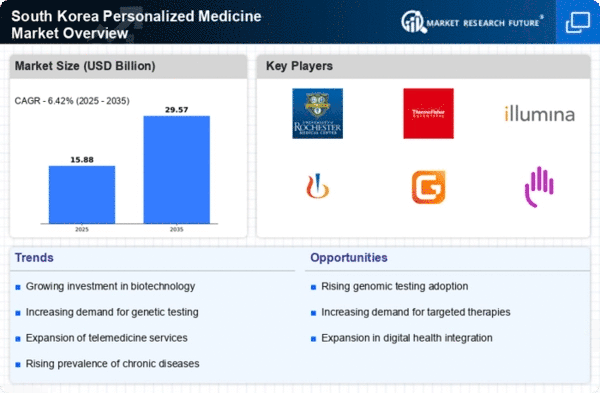Rising Incidence of Chronic Diseases
The increasing prevalence of chronic diseases in South Korea is a pivotal driver for the personalized medicine market. As the population ages, conditions such as diabetes, cancer, and cardiovascular diseases are becoming more common. This trend necessitates tailored treatment approaches that can effectively address individual patient needs. According to recent health statistics, chronic diseases account for approximately 80% of healthcare costs in the country. Consequently, healthcare providers are increasingly adopting personalized medicine strategies to enhance treatment efficacy and improve patient outcomes. The personalized medicine market is thus positioned to grow as healthcare systems seek innovative solutions to manage these complex health challenges.
Advancements in Diagnostic Technologies
Innovations in diagnostic technologies are significantly influencing the personalized medicine market. The development of advanced genomic sequencing and biomarker identification techniques allows for more precise patient stratification and treatment customization. In South Korea, the market for diagnostic tools is projected to reach $1.5 billion by 2026, reflecting a robust demand for technologies that facilitate personalized treatment plans. These advancements enable healthcare professionals to identify the most effective therapies based on individual genetic profiles, thereby improving treatment success rates. As diagnostic capabilities continue to evolve, the personalized medicine market is likely to expand, driven by the need for more accurate and efficient healthcare solutions.
Collaboration Between Academia and Industry
The collaboration between academic institutions and the pharmaceutical industry is a significant driver of the personalized medicine market. In South Korea, partnerships are being formed to leverage academic research in genomics and biotechnology for the development of new therapies. These collaborations often result in the translation of scientific discoveries into practical applications, enhancing the efficacy of personalized treatments. With an estimated 30% of new drug approvals in recent years stemming from such partnerships, the impact on the personalized medicine market is profound. This synergy not only accelerates the pace of innovation but also ensures that emerging therapies are grounded in robust scientific evidence, ultimately benefiting patients.
Regulatory Support for Innovative Therapies
Regulatory frameworks in South Korea are increasingly supportive of innovative therapies, which is beneficial for the personalized medicine market. The Ministry of Food and Drug Safety (MFDS) has implemented streamlined approval processes for personalized treatments, facilitating quicker access to novel therapies for patients. This regulatory environment encourages pharmaceutical companies to invest in the development of personalized medicine solutions. As a result, the market is likely to experience accelerated growth, with more products entering the market. The proactive stance of regulatory bodies not only enhances patient access to cutting-edge treatments but also stimulates competition among manufacturers, further driving innovation in the personalized medicine market.
Increased Investment in Research and Development
Investment in research and development (R&D) is a crucial driver for the personalized medicine market. South Korea's government and private sector are channeling substantial resources into R&D initiatives aimed at discovering new therapies and improving existing ones. In 2025, R&D spending in the biopharmaceutical sector is expected to exceed $3 billion, highlighting the commitment to advancing personalized medicine. This influx of funding supports the exploration of novel treatment modalities and the integration of cutting-edge technologies, such as artificial intelligence and machine learning, into healthcare practices. As R&D efforts intensify, the personalized medicine market is poised for significant growth, fostering innovation and enhancing patient care.
















